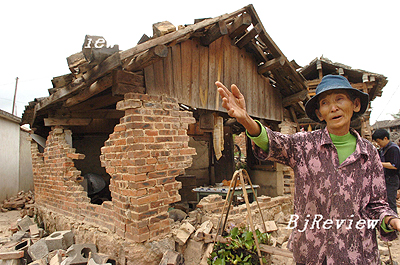
Non-Existent Anti-Disaster Systems
On June 3, a magnitude 6.4 earthquake jolted Pu'er City in southwest China's Yunnan Province, claiming three lives and injuring more than 300 people.
In China, almost every earthquake or flood or any natural disaster ends up with overwhelming loss of lives and property.
There have been over 20 earthquakes above magnitude 5 in Pu'er since 1990. However, even in such a vulnerable place, there is no complete earthquake monitoring system and no houses are built in an anti-seismic way.
On the same day Pu'er was struck by the strong quake, seven counties and cities in central China's Jiangxi Province were hit by floods. Thousands of houses in the affected areas were submerged or destroyed, forcing more than 250,000 people to be displaced, also with mounting casualties. Actually, in many places around the country, rains spell disasters.
Without adequate precautionary equipment or systems, residents are doomed to suffer from natural disasters. Having seen so many avoidable and controllable disasters, it's time for society, especially the government, to consider establishing a crisis management system to guard people against various natural disasters.
The Beijing News
Gray Income-Where Does the Buck Stop?
The National Economic Research Institute under the China Reform Foundation announced on June 8 that, based on the institute's survey of a range of 2,000 residents from dozens of Chinese cities, the gray income (earnings from unlawful and other obscure channels) of urban residents amounted to 4.4 trillion yuan (about $575 billion) in 2005. This is an astonishing figure, as official statistics put urban and rural residents' total incomes at 8.3 trillion yuan (more than $1.08 trillion).
Since the figure is produced on the basis of a well-designed survey, it is quite reliable. However, is it reasonable to say that all the urban residents are responsible for the hefty gray income?
After all, not everyone can make earnings through obscure channels. In other words, almost all who can enjoy gray income have certain privilege or power. Ordinary residents just don't have access to these channels.
Looking at this survey it gives the impression that the whole society is responsible for the problem and since every one shares the shame, it's no longer a shame. It is therefore necessary to investigate and find out who are the real beneficiaries of gray income.
The existence of this huge amount of money from unidentified sources implies that China is in urgent need of a developed family property declaration system.
China Youth Daily
Students Get to Break Traffic Rules
Before the college entrance examination in early June, Xi'an City in Shaanxi Province put forward a regulation stating that should drivers of cars that carry students taking part in the exam break traffic rules, they will not get punished.
To take some measures to ensure that cars taking examinees can come and go smoothly is a good idea. However, it's unwise to do so at the cost of the overall fairness and equality in society.
This regulation actually is a reflection of society's overemphasis on the college entrance examination, which is nothing but a test of students' knowledge and memorizing capability. However, even nowadays, many people still believe that to pass the exam means success in life, while failing the exam means failure in life. But facts show this is not the case in present days.
College entrance exam participants are not supposed to enjoy so many privileges and people should treat the exam in a more rational way. In this sense, it's better to see less or no rules similar to those issued in Xi'an.
People's Daily
Speculation Boosts Housing Prices
According to the National Development and Reform Commission, in April, housing prices in China's urban areas maintained a strong uptrend. On closer examination, it is not actually the demand for housing, but speculative investment, that boosts the prices.
Beijing now has a permanent population of 15.38 million. Suppose every family has three members, meaning there are 5.12 million households. According to the Beijing Statistics Bureau, at least one in 10 households in the city have two houses and some even have several. If this is the case, at least 512,000 apartments are idled, which amount to the total home sales in the past six years in Beijing. Property speculation is making the supply seem insufficient, which then drives up the already rocketing housing prices.
Given the harm of such speculative investment, in Singapore, those who possess several apartments or those who organize such speculative investment will be punished by law. In the United States the government has explicit regulations on this issue. However, in China, so far, there are no laws or regulations in this field.
If the real estate market continues to be manipulated by speculators, the housing issue will remain a big problem for the Chinese society.
Beijing Youth Daily | 